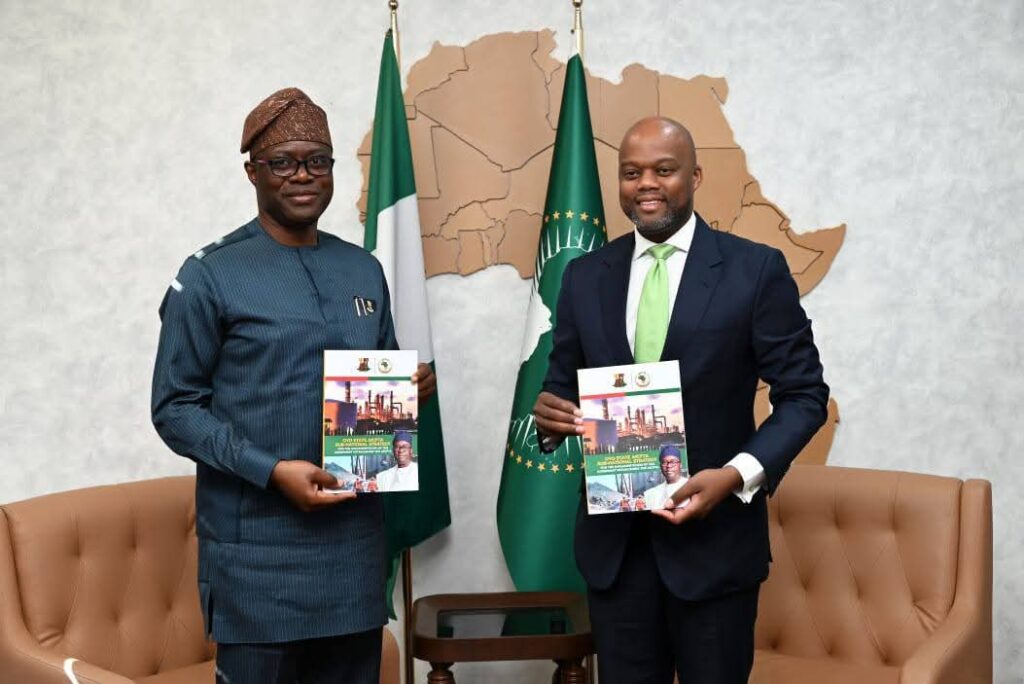When leaders of Africa’s sub-national governments gathered in Abuja for the second African Sub-sovereign Governments Network (AfSNET) Conference on September 30, 2022, one message echoed through the hall: Africa’s sub-nationals must rise and own the African Continental Free Trade Area (AfCFTA) agenda.
The event, hosted by the African Export-Import Bank (Afreximbank) in collaboration with the Nigeria Governors’ Forum (NGF), brought together all 36 Nigerian governors and senior officials from regions, provinces, and states across the continent. Its goal was clear — to ensure that AfCFTA’s benefits reached every African community.
Presiding over the opening session, former President Muhammadu Buhari described sub-national participation as vital for Africa to “carve its niche in the global value chain from the constituent units up.” He noted that collaboration among local governments could accelerate inclusive growth for the continent’s 1.4 billion people.
In his remarks, then Afreximbank President, Professor Benedict Oramah, emphasized that while trade policies are often national, their implementation is inherently local. “Regional and local governments must be involved if the AfCFTA is to deliver its full potential,” he said.
That call was made three years ago. Yet, of the 591 sub-national governments across Africa, only one—Oyo State, Nigeria—has successfully launched its own AfCFTA Implementation Strategy. And at the centre of that achievement is Governor Seyi Makinde, whose foresight continues to shape not only his state’s destiny but also Africa’s trade future.
A Vision Rooted in Global Ambition
For Makinde, economic growth cannot thrive on local consumption alone. His belief in export-led industrialization has guided Oyo’s development model—an approach that drives innovation, attracts investment, and opens up global markets for local entrepreneurs.
At the 2024 Oyo State International Trade Fair, EXPOYO 2024, he reaffirmed this vision:
“We must shift from import substitution to export orientation. Our goal is to produce here and sell to the world. That’s how we’ll earn foreign exchange and build an economy that works for everyone.”
His words resonated with the essence of AfCFTA — a single continental market linking 1.4 billion Africans with a combined GDP of $3.4 trillion. Makinde understood early that Oyo’s farmers, manufacturers, and entrepreneurs could only unlock that opportunity through a localized implementation of the AfCFTA framework.

📸 #SOFO Photospeak: Governor Seyi Makinde with H.E. Wamkele Mene, Secretary-General of the AfCFTA, during his visit to the AfCFTA Headquarters in Accra, Ghana, to submit Oyo State’s post-launch engagement report.
Turning Vision into Strategy
Shortly after beginning his second term, Governor Makinde appointed Ms. Neo Theodore Tlhaselo, an international trade expert and CEO of Conversation with Africa, as Special Adviser on International Trade and AfCFTA. Her mandate: to design and domesticate Oyo’s AfCFTA Implementation Strategy.
By December 2024, Oyo State hosted a consultative forum at the University of Ibadan, where Makinde outlined seven strategic sectors the state would leverage under AfCFTA — including agribusiness, agro-processing, logistics, SME development, tourism, and infrastructure.
“Since 2019, agribusiness has been a key driver of our economy,” the governor said. “With crops like cocoa, cassava, maize, and cashew, we have the capacity to become a major exporter within Africa.”
From Ibadan to Accra — Oyo Takes the Lead
In early 2025, Makinde visited the AfCFTA Secretariat in Accra, Ghana, making Oyo the first sub-national leader ever hosted by the body. His proactive engagement paid off. By June, AfCFTA Secretary-General Wamkele Mene reciprocated with a visit to Oyo State to explore partnerships and opportunities.
That collaboration culminated on September 12, 2025, when Mene officially launched the Oyo State Sub-national AfCFTA Implementation Strategy in Ibadan — a first for any sub-national government in Africa.
“AfCFTA is not a distant dream but a present-day opportunity,” Mene said during the launch. “Governor Makinde’s leadership proves that African states can take ownership of continental prosperity from the ground up.”
Oyo State completed its post-launch engagement in October 2025, formally submitting documentation to be listed as an official party to the AfCFTA agreement.
Trailblazing Across Sectors
Makinde’s leadership has repeatedly rewritten the rulebook for governance in Nigeria. During the COVID-19 pandemic, while most states enforced total lockdowns, he opted for a data-driven, balanced approach — keeping markets and farms open while enforcing health protocols. Though criticized at first, his strategy later became a national model.
He was also the first Nigerian governor to institutionalize agribusiness as a government policy, establishing the Oyo State Agribusiness Development Agency (OYSADA) and building the Fasola Agro-Industrial Hub, now designated by the African Development Bank as Nigeria’s first Special Agro-Industrial Processing Zone.
Today, Fasola hosts multinational firms and has attracted visits from officials of over 16 Nigerian states and five African nations — including Sierra Leone’s President Dr. Julius Maada Bio, who came to study the model for his country’s Feed Salone Initiative.
Reforming Health, Education, and Markets
In February 2025, Oyo State broke new ground again by launching a health insurance scheme for 10,000 public school pupils — the first of its kind among Nigerian sub-nationals. The initiative ensures that every child, regardless of background, has access to quality healthcare.
Oyo also became the first African sub-national admitted into the World Union of Wholesale Markets (WUWM), a global body promoting food system innovation and sustainability. To follow up, the state signed an agreement with Semmaris, operators of the Rungis International Market in France, to develop a modern agri-food market in Ijaiye, Ibadan.
“This market will be world-class — reducing post-harvest losses, empowering farmers, and connecting Oyo to continental supply chains,” Makinde said.
From Pace Setter to Pan-African Model
Over the years, Makinde has earned a reputation as Nigeria’s “Pace Setter Governor.” But with Oyo’s admission into AfCFTA and WUWM, he has extended that legacy beyond Nigeria’s borders — positioning the state as a continental model for innovation, inclusion, and forward-thinking governance.
Makinde’s leadership is no longer just national. It’s continental — a testament to how vision, courage, and collaboration can turn one state’s ambition into Africa’s shared future.
Leave a Reply